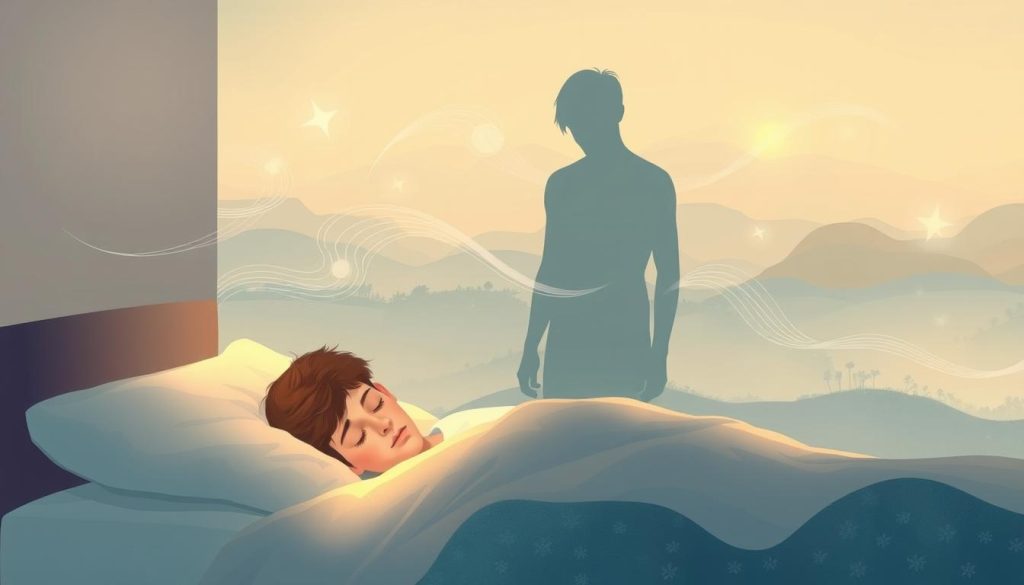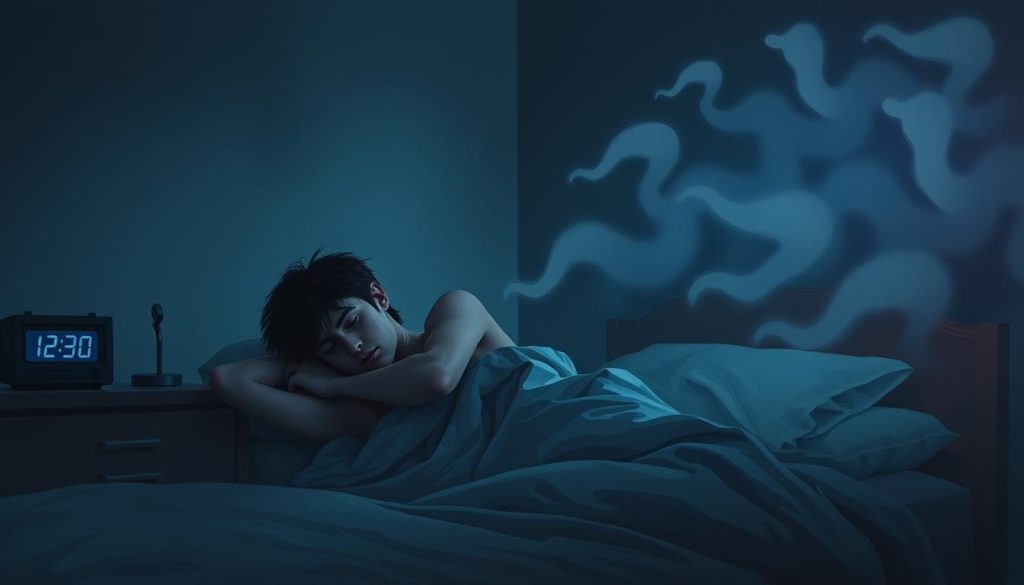Today’s teens face unique rest challenges that previous generations never experienced. Modern life has created a perfect storm of factors that disrupt healthy sleep schedules for adolescents. Academic pressure, social media, and busy family routines all compete for precious nighttime hours.
The stakes have never been higher for getting this right. Research shows that proper rest directly impacts everything from grades to mental health. When teens don’t get enough quality rest, their bodies and minds pay the price.
Parents, teachers, and doctors are starting to recognize this crisis. Poor rest patterns among youth can lead to serious problems with focus, mood, and physical development. The good news is that understanding these challenges is the first step toward solutions.
This isn’t just about feeling tired in the morning. Healthy bedtime routines for teenagers can transform their entire well-being. From better academic performance to stronger immune systems, quality rest touches every aspect of a teen’s life.
Understanding Teenagers’ Sleep Needs
Sleep needs change a lot during adolescence. This is because the teenage brain is going through big changes. These changes are not just habits but are essential for teens.
During puberty, the body’s internal clock changes a lot. This creates a big conflict between what society expects and what the body needs. Teens aren’t being stubborn when they stay up late and have trouble waking up early. They’re just following their body’s natural rhythm.
The Science of Sleep During Adolescence
Adolescent sleep patterns change due to hormonal shifts in puberty. The brain’s melatonin production, which makes us feel sleepy, gets delayed by about two hours. This means teens naturally feel awake until around 11 PM or later.
The part of the brain that controls our internal clock becomes less sensitive to morning light during adolescence. This makes it harder for teens to wake up early. Their brains are actually set to sleep later and wake up later.
Growth hormone release peaks during deep sleep in teens. This hormone is key for physical growth, brain maturation, and tissue repair. Without enough deep sleep, teens miss out on important growth processes.

Sleep Patterns in Teenagers
Circadian rhythms in youth are delayed compared to other age groups. Most teens naturally fall asleep between 11 PM and 1 AM, no matter how early they try to go to bed. This shift starts around age 13 and lasts through the late teens.
The ideal sleep for teens is 8 to 10 hours per night. But most teens get less because of early school times and social pressures. This leads to a sleep debt that keeps building up.
On weekends, teens sleep in more, often until 9 AM or later. This isn’t laziness. It’s their body catching up on missed sleep and following its natural rhythm.
Sleep architecture in teens is different from adults. Teens spend more time in deep sleep stages, which are key for memory and brain development. They also have longer REM cycles, which help with emotional processing and learning.
Importance of REM Sleep
REM sleep is crucial for teenage brain development and emotional control. During this stage, the brain processes emotions, consolidates memories, and strengthens neural connections. Teens need more REM sleep than adults to support their brains.
Memory consolidation mainly happens during REM sleep. This is why it’s so important for academic success. Without enough REM sleep, learning becomes much harder.
The following processes occur during REM sleep in teenagers:
- Emotional memory processing and regulation
- Creative problem-solving and insight formation
- Brain detoxification and waste removal
- Synaptic pruning for neural efficiency
- Hormone regulation for growth and development
REM sleep deprivation in teens can cause mood swings, trouble concentrating, and poor decision-making. These effects are especially strong during adolescence because the brain is still developing and needs quality sleep.
Common Sleep Issues Among Teenagers
Sleep disorders in teens are common today. These issues affect their health, school work, and life quality. It’s important to know when to seek help for sleep problems.
Teenagers face many sleep challenges. Some are short-term, like stress or lifestyle changes. Others need medical help.

Insomnia and Its Effects
Insomnia affects about 23% of teens. It makes it hard to fall asleep, stay asleep, or wake up too early. This can make them tired in school but hard to sleep at night.
Signs of insomnia in teens include:
- Taking more than 30 minutes to fall asleep regularly
- Waking up multiple times during the night
- Feeling unrefreshed after a full night’s sleep
- Difficulty concentrating during the day
- Increased irritability and mood swings
Delayed sleep phase syndrome is common in teens. It makes them naturally sleep and wake up later. It’s not just about wanting to stay up late.
Teens with this issue can’t sleep before 1 AM. They then find it hard to wake up for school. They need to sleep in on weekends to catch up.
The Role of Technology on Sleep
Technology affects teen sleep. Devices like phones and computers make it hard to sleep. This is because they emit blue light, which suppresses melatonin.
Screen time before bed disrupts sleep:
- Blue light delays sleepiness by 1-3 hours
- Engaging content keeps the mind active
- Social media and gaming can cause anxiety
- Notifications interrupt sleep cycles
- Fear of missing out (FOMO) encourages late-night checking
Many teens use devices close to bedtime. This makes it hard for their brains to sleep. Digital content also keeps them awake.
Studies show devices before bed lead to poor sleep. Teens feel tired the next day. This creates a cycle of fatigue and needing more stimulating activities.
Sleep Disorders and Diagnosis
Several sleep disorders in teens need a doctor’s help. Sleep apnea, restless leg syndrome, and narcolepsy are examples. They can cause breathing problems, uncomfortable sensations, and excessive daytime sleepiness.
Signs of sleep disorders include:
- Loud snoring or breathing pauses during sleep
- Extreme difficulty waking up despite adequate sleep time
- Falling asleep unexpectedly during the day
- Uncomfortable leg sensations that worsen at bedtime
- Sleep problems that persist despite good sleep habits
Diagnosis involves a sleep history and may include sleep studies. Specialists can tell if it’s a real disorder or just normal teen sleep. They also check for other health issues.
Early treatment of sleep disorders is key. It prevents long-term health problems and improves life quality. Parents should seek help if sleep issues last more than a few weeks or affect daily life.
Treatment varies by disorder. It may include sleep tips, therapy, or medication. The goal is to help teens sleep well for their health and development.
The Impact of Sleep on Academic Performance
Teenagers often think staying up late to study will improve their grades. But research shows this is not true. Instead, it can hurt their academic performance.
Getting enough sleep is key to doing well in school. Students who sleep well do better in all subjects. This is especially important in high school, when schoolwork gets harder.
Sleep Deprivation and Learning
Not getting enough sleep makes it hard to learn in class. Students who are tired can’t focus as well. Teachers often see these students struggling to stay engaged.
Teenagers who don’t sleep well also have trouble learning new things. Their brains work slower, making it hard to understand complex subjects. This makes it tough to keep up with schoolwork.
Also, tired students make more mistakes. Their decision-making skills are affected, leading to poor choices. This cycle of poor grades and stress makes it even harder to sleep well.
Memory Retention and Cognitive Function
Quality sleep is important for remembering what you learn. During deep sleep, the brain moves information from short-term to long-term memory. Without enough sleep, this process is disrupted.

Students who sleep well do better on tests and quizzes. Their brains can recall information more easily. This is especially important during exams.
Good sleep also helps with problem-solving and critical thinking. Well-rested teenagers can analyze situations better and find creative solutions. These skills are crucial for success in school and college.
Real-Life Examples of Sleep’s Effects
Many schools have seen big improvements by starting later. In Seattle, high schools with later start times saw better grades and attendance. There were also fewer behavioral problems.
There are many success stories of students improving their grades by sleeping better. Many students went from getting C’s to A’s by sleeping more. These changes often happen in just a few weeks.
Schools in Minnesota and Colorado have also seen positive changes. By changing schedules to help teens sleep more, they saw lasting improvements in grades. This shows that addressing sleep issues can help all students do better in school.
Physical Health and Sleep Quality
Sleep is key for teenage health, not just for feeling awake. It supports physical growth, immune function, and emotional balance. Teens need enough rest to stay healthy and grow well.
Sleep affects hormone levels in teens. It’s when the body releases growth hormones, crucial for growth. It also helps keep stress hormones in check.
Consequences of Poor Sleep Habits
Poor sleep harms teens’ health in many ways. They might feel weak, tired, and take longer to recover. Their bodies struggle to fix tissues and use nutrients.
Not enough sleep can mess with weight control. Teens might feel hungrier and eat more. This can lead to weight gain.
Sleep is also vital for sports performance. Without it, teens move slower, are less coordinated, and risk injuries. They also take longer to recover from sports.

Sleep and Immune Function
Sleep boosts the immune system in teens. It helps the body fight off infections. Teens who sleep well get sick less and recover faster.
Not sleeping enough weakens the immune system. It lowers the body’s ability to fight off infections. Sleep-deprived teens catch colds and other illnesses more often.
Naps can help when nighttime sleep is short. But, they should be short and before 3 PM. Long or late naps can mess up sleep patterns.
The Link Between Sleep and Mental Health
Sleep affects teens’ emotional health. It helps the brain handle emotions and stay calm. Without enough sleep, teens might feel irritable, anxious, and stressed.
Studies link sleep problems to depression in teens. Those who sleep less than seven hours a night are more likely to feel depressed. Sleep issues can cause or worsen mental health problems.
The teen brain needs sleep to process emotions and handle stress. Without it, teens might overreact and find it hard to deal with daily life. Good sleep helps teens stay emotionally balanced and do well in school and social life.
Tips for Developing Healthy Sleep Schedules
Helping teenagers get better sleep means creating a supportive sleep environment. Good sleep hygiene for teens involves several factors. These strategies can greatly improve their sleep each night.
Improving sleep quality starts with three key areas. The environment signals when it’s time to rest. Daily habits and timing also affect how well teens sleep.
Creating a Sleep-Friendly Environment
The bedroom environment greatly affects sleep. Keeping the room between 65 and 68 degrees Fahrenheit is best for most teens.
Lighting is also important. Dark rooms help the brain make melatonin, the sleep hormone. Blackout curtains or eye masks can block outside light.
Quiet is essential for sleep. White noise machines or earplugs can block out noise. Some teens find soft sounds like nature recordings helpful.
Good bedding supports better sleep. Quality pillows and mattresses help reduce tossing and turning.
Avoiding Stimulants Before Bed
Stimulants can disrupt sleep for hours after use. Avoid caffeine after 2 PM. This allows the body to process it before bedtime.
Nicotine is also a stimulant. Teenagers should avoid nicotine products for at least two hours before bed. Its effects can last longer than expected.
Some medications and supplements can also affect sleep. Check over-the-counter medications for caffeine or stimulants. Teens should talk to their healthcare providers about medication timing.
Large meals before bed can also disrupt sleep. Heavy or spicy foods require digestion, keeping the body awake. Light snacks are okay if hunger might otherwise keep you awake.
Establishing a Consistent Sleep Routine
Regular bedtimes and wake times help regulate the body’s clock. Try to keep the same schedule even on weekends. Small changes of 30 minutes are okay, but bigger changes can mess with sleep.
Pre-sleep rituals signal bedtime. Activities like reading, gentle stretching, or soft music can help transition to sleep.
The hour before bed should be calm. Avoid intense exercise, exciting video games, or stressful talks. This time helps the mind and body prepare for sleep.
Starting these sleep hygiene strategies takes time and patience. Begin with one or two changes and add more as new habits form. Consistency will lead to better sleep and overall well-being.
The Role of Parents in Teen Sleep Hygiene
Supporting your teenager’s sleep health is key. It requires understanding, patience, and strategies that respect their growing independence. Parents play a crucial role in teaching healthy sleep habits during these important years. It’s especially important to manage screen time together as a family.
Your role is more than just setting bedtime rules. It’s about creating an environment where good sleep habits can grow naturally. This means showing healthy behaviors and giving your teen space to learn about sleep on their own.
Communicating About Sleep Needs
Talking openly about sleep is the first step to healthy habits. Start by asking how your teen feels after different amounts of sleep. This helps them connect their own experiences with sleep quality.
Share sleep science in ways they can understand. Explain how screen time affects sleep without being too preachy. Teens do better when they know the reasons behind sleep advice.
Listen to your teenager’s concerns about sleep. They might worry about missing out or falling behind in school. Acknowledge these feelings and work together to find sleep-friendly solutions.
Choose the right time to talk about sleep. Avoid when they’re tired or stressed. Pick moments when they’re relaxed and can focus on the conversation.
Encouraging Healthy Habits at Home
Creating a sleep-friendly home needs family policies and consistent action. Start with quiet hours that help everyone prepare for sleep. This shows that healthy sleep is a family value, not just for teens.
Be a good sleep role model yourself. Teens notice when parents stay up late or drink caffeine before bed. Your actions are more powerful than any rules you set for them.
Make bedrooms sleep-friendly. Help your teen pick out blackout curtains, comfy bedding, and the right room temperature. These changes show you care about their sleep success.
Think about how meal times affect sleep. Late dinners or heavy snacks can disrupt sleep. Plan meals that help, not hurt, sleep preparation.
Encourage relaxing activities before bed instead of screens. Reading, stretching, or calming music can help create positive bedtime routines. This shows the link between screen time and sleep more clearly.
Monitoring Technology Use
Monitoring tech use needs a balance between protection and trust. Instead of strict bans, work with your teen to understand how devices affect sleep. This builds their awareness of screen time’s impact on sleep.
Set device-free zones and times for the whole family. Bedrooms and dining rooms can be tech-free in the evenings. This sets boundaries without targeting your teenager.
Use parental controls wisely and explain them. Tell your teen why you’re setting limits to help them sleep better. Many teens understand that apps are designed to be addictive.
Consider charging stations outside bedrooms for everyone. This removes the urge for late-night scrolling and shows that screen time rules apply to all.
Help your teen notice their tech use and sleep patterns. Encourage them to see how they feel after using devices late versus early. This self-awareness helps them make healthier choices.
Be ready to adjust rules as your teen shows responsibility. Giving them more freedom with tech can motivate them to make better choices about sleep and screen time.
Community and School Initiatives for Better Sleep
Changing teenage sleep habits needs the whole community’s help. Schools, families, and healthcare must join forces. They need to create systems that focus on student rest and health.
Programs Promoting Sleep Awareness
Many schools now have sleep education programs. These teach students about good sleep habits. For example, Fairfax County schools have seen great results from talks on sleep and time management.
Adjusting School Start Times
Studies show later school start times help students a lot. Schools in Seattle and Minneapolis started at 8:45 AM. They saw better attendance and higher scores.
Changing start times is hard because of transportation and schedules. But, the health benefits make it worth it.
Collaborating with Healthcare Professionals
School nurses and counselors are crucial in spotting sleep issues early. They connect students with sleep experts and offer family resources. Regular health checks help catch problems before they affect schoolwork.
Helping teenage sleep health benefits everyone in the community. It leads to better youth development and lower health costs. When schools, parents, and healthcare work together, students do well in school and life.

